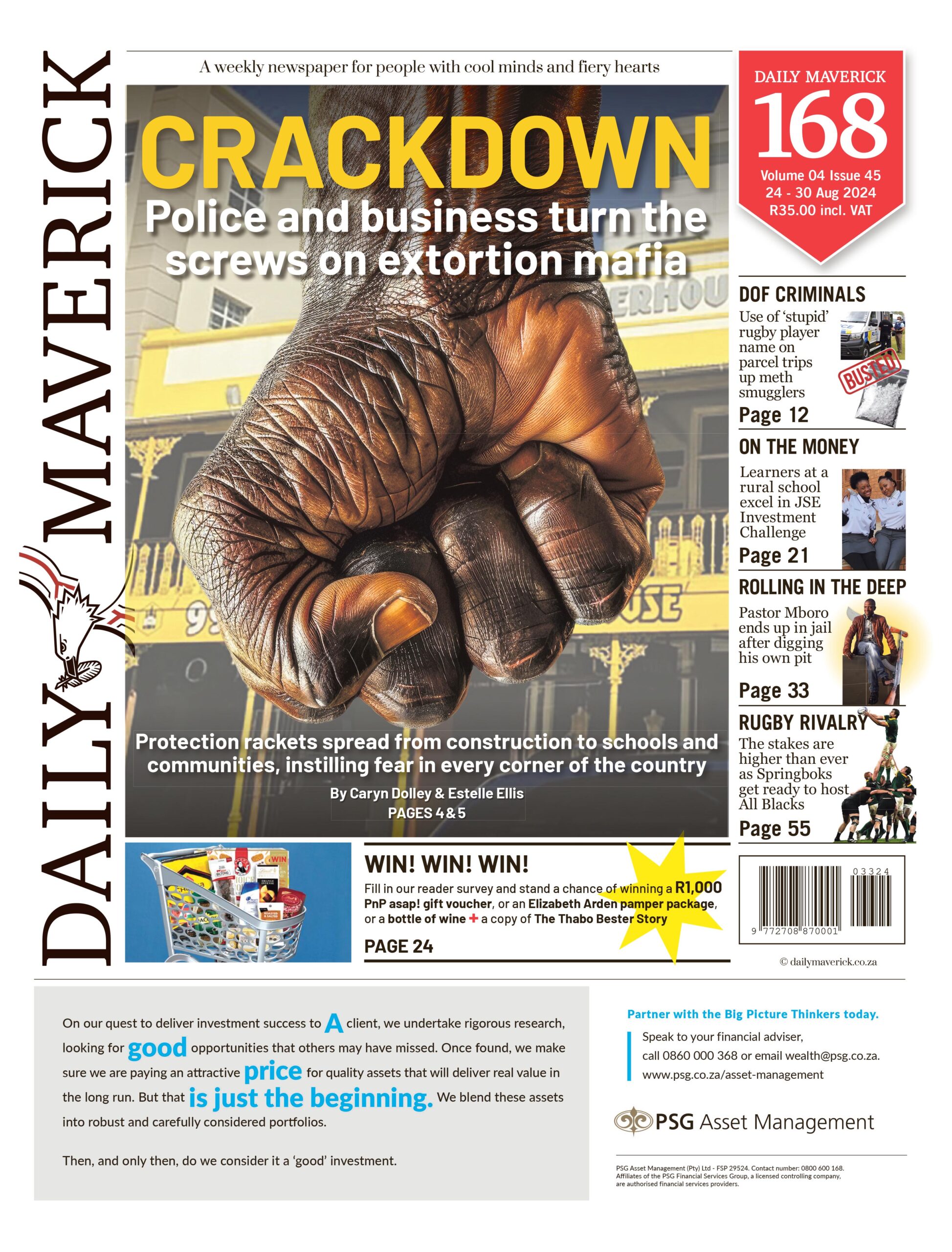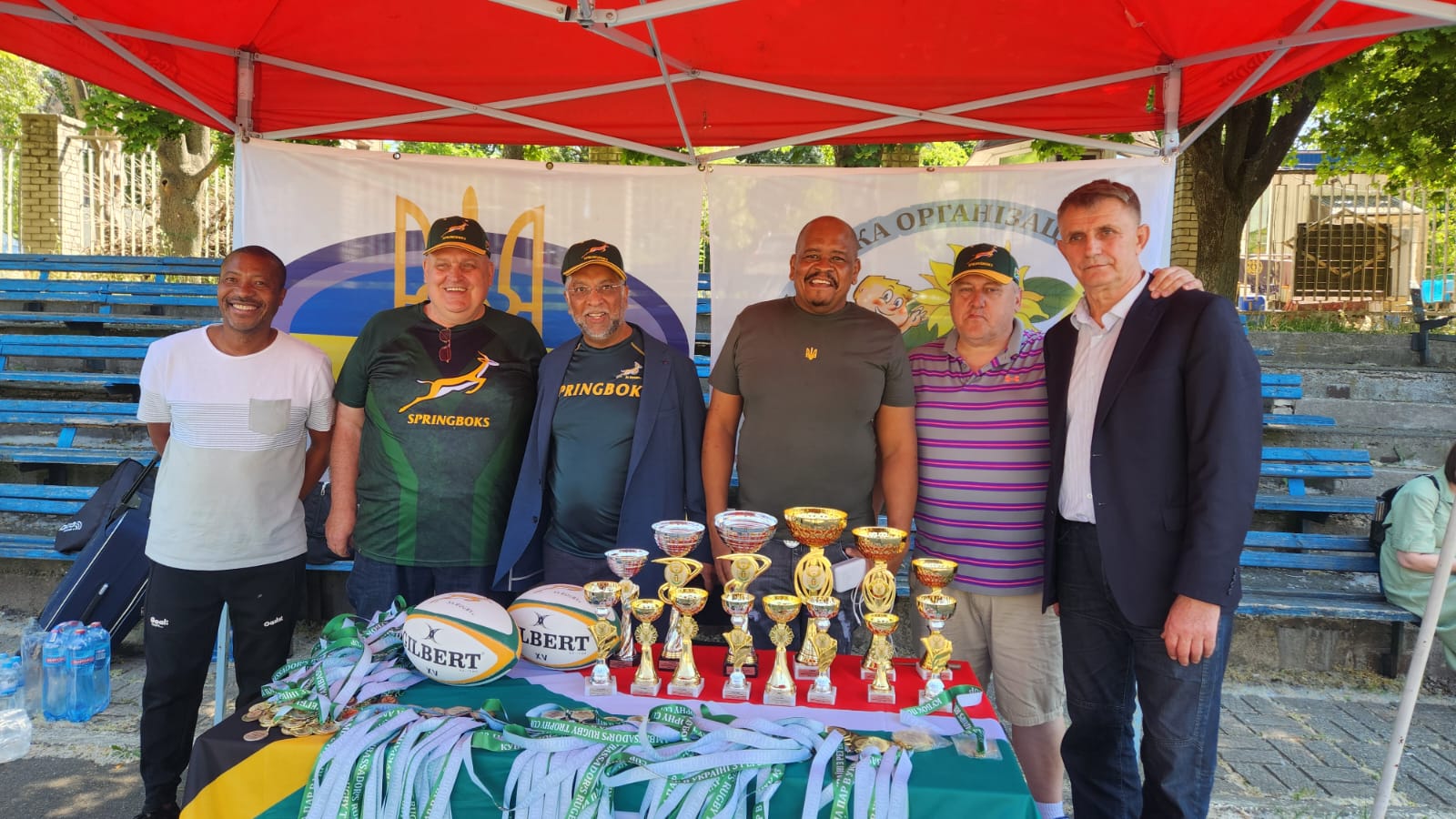As the final whistle loomed, an air raid siren wailed over the stadium of the Kyiv National University of Economics and throughout the capital city. It was 1.56pm on 25 May and there were only four minutes left to play in the last match in the South African Ambassador to Ukraine Rugby Cup tournament. Everyone held their breath. The siren stopped at 2.12pm. The danger had passed.
The players were able to finish the game and South Africa’s ambassador to Ukraine, Shoayb Casoo, handed out the trophies and medals. More than 140 young rugby players from 14 teams drawn from Kyiv schools had participated in this 10th iteration of the tournament. For safety reasons, there were no spectators apart from parents, officials and fellow players, and the event could not be advertised in advance.
Given Pretoria’s friendship with Moscow, it was ironic that Casoo had to tune one ear towards a possible missile strike by Russia that day. But the Ukrainians greatly appreciated his resuming the annual event, which had been suspended by Covid-19 and Russia’s full-scale invasion in February 2022.
They saw this as a kind of ping-pong diplomacy, using South Africa’s best sport as an instrument to advance relations that have been chilly sometimes, because of Pretoria’s evident preference for Russia.
The Ukrainians also commended Casoo for returning the embassy to Kyiv. It had moved to Hungary and then Warsaw after the war started. He is working on returning the issuing of visas to Kyiv, which would make a big difference to many Ukrainians.
The tournament was a microcosm of how rugby, more generally, is surviving across the country, defiant, like Ukraine itself, in the face of war.
“Probably it sounds weird, but we really believe that the war will be over soon and so none of our clubs has closed officially. They have just suspended some activities,” said Iryna Arkhytska, the Ukraine Rugby Union’s general manager.
The South African Ambassador to Ukraine Rugby Cup was launched in much happier times, in 2010. Dries Venter, South Africa’s ambassador then, still recalls the great enthusiasm for rugby among Ukrainians and how delighted they were to invite him to their Test matches. He also remembers that the sport had more of a following in the eastern and southern parts of Ukraine – now largely occupied by Russian troops.
The former deputy South African ambassador to Ukraine, Francois Hentschel, a rugby enthusiast, did much to initiate the event. The embassy asked the SA Rugby Union to invite Leonid Deineko, president of the Child and Youth Rugby Development Fund in Ukraine, to visit South Africa in 2007, meeting rugby officials in Johannesburg, Pretoria and Cape Town. On his return, Deineko, a former front row forward for Ukraine, launched the South African Ambassador Cup tournament with the embassy in 2010.
 Iryna Arkhytska, the Ukraine Rugby Union’s general manager. (Photo: Supplied)
Iryna Arkhytska, the Ukraine Rugby Union’s general manager. (Photo: Supplied)
He organised it this year with the support of the Ministry of Education and Culture, the Yedina Krania charitable foundation, the Ukrainian Association of South Africa and, of course, the South African embassy.
The teams played tag rugby, in which each player has a tag or ribbon attached to either side of their shorts, and an opponent removing a tag counts as a tackle.
No contact means boys and girls can play together. Fourteen teams competed in the event this year in two groups: juniors in grades 3 to 5 and seniors in grades 6 to 8.
Read more: War in Ukraine
Deineko noted that neither Covid-19 nor the war completely interrupted sporting events for children, though stringent safety precautions had to be taken.
“The sporting events are even more important in times of war as they serve an essential part of the psychosocial rehabilitation of Ukrainian children, who are daily spending long hours in the bomb shelters and are under constant stress to survive,” Deineko said.
He stressed that the tournament was inclusive and that teams of children with special needs took part.
Ukrainian rugby had to adapt to a new reality… such as air raid alarms, rocket attacks, curfews and a lack of electricity from time to time.
Casoo said the event marked “a significant milestone in the collaboration between South Africa and Ukraine”.
“More than rugby, it served to enhance the development of youth, their physical and mental health and well-being, and provided an avenue for the expression of their enthusiasm, their talents, their unrelenting spirit to rise above the challenges of war, and a freedom to just be who they are,” he said.
Like this tournament, Ukraine rugby as a whole is also surviving the war, but with difficulty. “The war severely damaged Ukrainian rugby in many ways,” said Arkhytska.
 South African ambassador Shoayb Casoo and Leonid Deineko, head of Ukraine children’s rugby development – both wearing Springbok jerseys – and other officials, with medal-winning rugby players. (Photo: Supplied)
South African ambassador Shoayb Casoo and Leonid Deineko, head of Ukraine children’s rugby development – both wearing Springbok jerseys – and other officials, with medal-winning rugby players. (Photo: Supplied)
 South African ambassador Shoayb Casoo and Leonid Deineko with other officials, parents and players. (Photo: Supplied)
South African ambassador Shoayb Casoo and Leonid Deineko with other officials, parents and players. (Photo: Supplied)
“Many children who were involved in rugby left our country with their parents, and few came back. The Ukrainian Championship became weaker and had to be organised with many conditions.
“National team players who stayed in Ukraine have limited capacity to train and maintain their playing skills and fitness. The only professional club, Olymp RC, which is based in Kharkiv city, was cut off from funding. Some rugby facilities in Kharkiv and Kyiv region were damaged by rockets.”
And, she said, 18 championship players from rugby clubs around the country had died as soldiers in the war.
“Ukrainian rugby had to adapt to a new reality… such as air raid alarms, rocket attacks, curfews and a lack of electricity from time to time.
 Dries Venter, then South Africa’s ambassador to Ukraine, presenting trophies at the first South African Ambassador to Ukraine Rugby Cup tournament in 2010. (Photo: Supplied)
Dries Venter, then South Africa’s ambassador to Ukraine, presenting trophies at the first South African Ambassador to Ukraine Rugby Cup tournament in 2010. (Photo: Supplied)
 Iryna Arkhytska, the Ukraine Rugby Union’s general manager. (Photo: Supplied)
Iryna Arkhytska, the Ukraine Rugby Union’s general manager. (Photo: Supplied)
 Iryna Arkhytska. (Photo: Supplied)
Iryna Arkhytska. (Photo: Supplied)
“When air raid alarms sound, we must stop the competitions and go to the shelter. Spectators are not allowed. In some regions we cannot announce sport events due to safety measures.”
Despite all these and many more setbacks, Arkhytska remains hopeful. “The future of Ukrainian rugby is about people: players, coaches, doctors, managers, fans, supporters and believers – those who are dedicated to rugby and keep it in their hearts.
“I believe that together we will be able to help our sport to bloom in the future.” DM
This story first appeared in our weekly Daily Maverick 168 newspaper, which is available countrywide for R35.





 Iryna Arkhytska, the Ukraine Rugby Union’s general manager
Iryna Arkhytska, the Ukraine Rugby Union’s general manager 